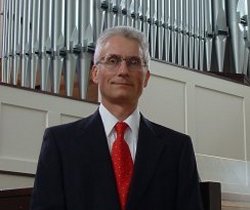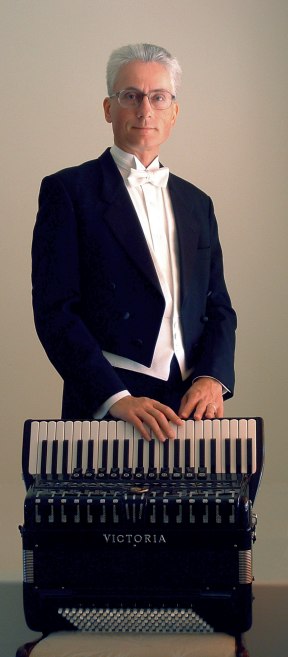
| | Organist | Accordionist | Composer | Conductor | Author | Educator |

 |
Henry Doktorski
|
 |

As the gaslights dimmed, San Francisco began recovering from the Great Earthquake. The Wright brothers began flapping their wings and Henry Ford started churning out horseless carriages in Detroit. It was then that Guido and Pietro Deiro introduced the piano-accordion to America. The Deiro Brothers
A review of the solo lecture/recital by Henry Doktorski for the Chicago Accordion Club on September 19, 2005
by Ron Grenda
Henry Doktorski glided unto center stage at the Chicago Accordion Club on September 19, 2005 and took members and guests back to those early days of vaudeville and ragtime. The elegant gray-haired gentleman was dressed in white tie and tails while bearing his 31-pound black-bellowed Victoria Emperor Converter accordion. He began the performance with Guido Deiro s My Florence Waltz featuring virtuoso ornamentation of every kind as may have been played by the pioneer musician a century ago. Rolling chords, tremolo, glissando, and bellows shake clearly displayed the essence of what the new piano-accordion might have sounded like to Guido s audience.
Mr. Doktorski humorously related the background of the Deiro brothers including how Guido was whacked on his head with his first button accordion. Guido [and Pietro] worked in tunnels and mines in Northern Italy, Switzerland, and Alsace-Lorraine while dreaming of a music career. He found that career after immigrating to The West Coast of America shortly after his brother Pietro in 1908 and bringing his Ranco piano-accordion along for the boat ride. About five years later the Deiro Rag was published. Henry played Guido s composition with great finesse and control reminding us somewhat of the stylistic showmanship and artistry of the great classical bayanist Dr. Friedrich Lips.
Henry started a lot of toe tapping with Los Bomberos March. The fire engine pumpers march had many register changes used to great effect. Bassoon, clarinet, violin, and master combinations had listeners imagining old time marching bands passing in sequence in a Main Street parade. Henry next displayed dance music virtuosity by using his long fingers for flying scales in Guido s Neapolitan Polka. The Italian folksongs of Guido Deiro s youth may have colored such a fine work.
Guido evidently had every accordion player s problem of having countless members of the opposite gender throwing themselves at him. His weaknesses led to four marriages including a secret one with Mae West. Henry did not elucidate any of his own problems; instead, he displayed beautiful changes in dynamics while marching in with Pietro s Return by Pietro Deiro.
Pietro was Guido s younger brother who preceded him to America. Pietro learned piano-accordion from his brother in Washington and went on to a very successful future in performance, composition, and arranging. Beautiful Days waltz of Pietro showcased multiple artistically deliberate reed changes by Henry. With Quick Silver, he raced up and down the keyboard with outstanding technique for the novelty number. The Celestina Polka was not meant to be danced; therefore, the elegant polka for the ear was performed with great style by Henry Doktorski.
As the star took questions from the audience, [90-year-old] Joe Warput of Glenwood told of his memory of playing a Pietro Deiro composition for Pietro Deiro in 1935 at a Chicago accordion convention!
The classical Imperia Overture by Joe s old inspiration ended with a standing ovation in appreciation for the Pittsburgh piano-accordionist making the Deiro pioneering songs seem so fresh and new.
Henry Doktorski was kind enough to guide his listeners back to the mid-twentieth century with an encore of his tremendous arrangement of Richard Rodger s Edelweiss. The rather simple familiar tune was exquisitely embellished and, deservingly, brought everyone again to their feet. The delicate flower has often heard the echoes of accordions in the Tyrolean Alps where the Deiro brothers once played. May the echoes of Henry Doktorski s wonderful performance, too, succeed in reminding everyone that the piano-accordion may, indeed, bloom and grow forever just like those little white mountain flowers.
Reprinted with permission from the October 2005 issue of the Chicago Accordion Club Newsletter: Accordiana.
|